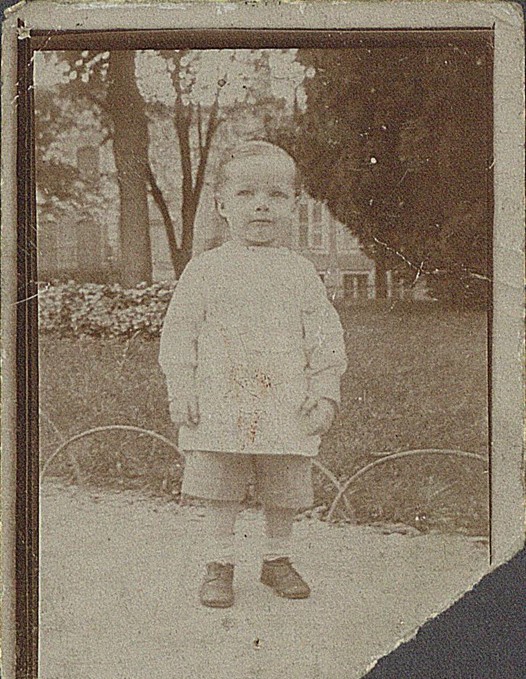Volf (Wolf) AGREST
Volf Agrest was born on October 21, 1933 in Nancy, France and murdered on August 5, 1944 in Auschwitz. His childhood was stolen from him and plagued with turmoil. In the spring of 1940, his family fled Nancy; this was the just the beginning of a period of upheaval, uncertainty and anxiety about the future.
Wolf Agrest was born on October 21, 1933 in Nancy. Official records sometimes list the date as October 24 or 27, however. His mother was Golda Agrest, née Chaïa, a seamstress, born on September 6, 1899 in Lukow, a town with a population of about 30,000 located in eastern Poland, about 55 miles north of Lublin.
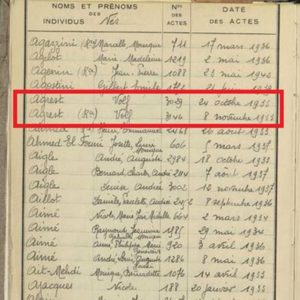
Ten-year register of births; Nancy municipal archives
Her mother, Golda, after her husband died, lived with a man by the name of Weiss [1]. Wolf took his mother’s surname since his biological father was still married, and did not officially recognize the child as his.
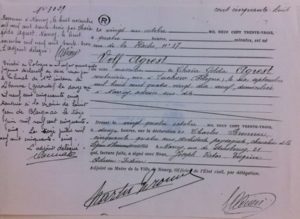
Volf Agrest’s birth certificate; From the Ministry of Defence Historical Service historique de la Défense in Caen
[1] Information provided by Martine Boréal, the daughter of Volf’s half-brother, Henik Bornsztajn.
Volf was the last of a sibling group from a low-income family. He had an older half-brother, Henrik-Albert Bornsztajn, who was born on March 19, 1925, and two half-sisters, Liki, born on August 26, 1927 and Marthe-Odile, born on May 4, 1929 in Belfort. His mother and her first husband, Mordka, also had a baby girl called Ida, who sadly died before her first birthday on July 14, 1927.
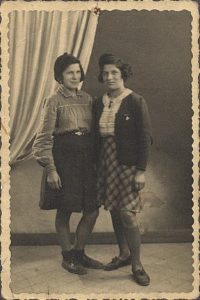
Volf’s half-sister Liki (on the left); Shoah Memorial in Paris, Serge Klarsfeld collection
There is no information available about Volf’s father, but we know that his mother came to France with her family in the 1920s, presumably to work and/or to escape the anti-Semitic atmosphere in Poland. After the First World War, due to the high numbers of casualties, France welcomed large numbers of Polish workers. On September 3, 1919, the French government signed an immigration agreement with its Polish counterpart, which provided for the recruitment of Polish citizens, with equivalent employment contracts and the same pay as the French workforce.
Golda and her children lived at 87, rue de la Hache, near the center of Nancy. The building they live in is no longer there.
We do not know where Volf went to school, but at the beginning of the war must have been in the first year of elementary school. At that time, children started school when they were six years old. However, from 1st September 1939 onwards, when war was declared, evacuation orders were issued for the towns and cities in Alsace, the Moselle department and the Meurthe & Moselle department, which included Nancy. Might this have been when his family moved to Saint-Jean-de-Blaignac, in the Gironde department in the southwest of France? This is where we found the next records about them, after the “phony war”, at the time of the German offensive in May 1940.
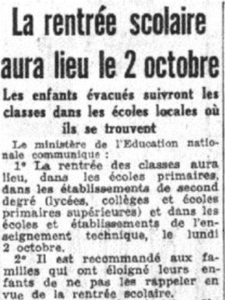
Article in “Le Petit Parisien” dated September 9, 1939
Did he start school on October 2, 1939, in Nancy or in Saint-Jean-de-Blaignac, a village with a population of a few hundred located on the Dordogne River south of Libourne, or even in the city of Bordeaux, to which the family subsequently moved? Either way, his education must have been disrupted.
A lot of other families from Nancy and the surrounding area moved to the Gironde department.
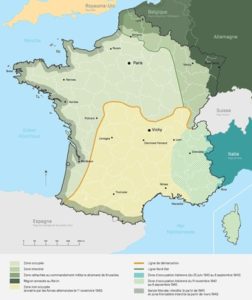
Map showing the various zones during the Occupation; Source: map based on Yvain Roué and Philippe Grange-Ponte, 2001-2012, “La France après l’armistice de 1940”; © cartography Réseau Canopé, 2016
The entire Atlantic coast was in the occupied zone (a restricted area as of 1941), including Bordeaux. The Vienne department, like 12 other departments, was cut in two by the demarcation line. Poitiers, Loudun and Châtellerault were in the occupied zone. The German anti-Semitic legislation came into force in the summer of 1940. In late 1940, the Germans expelled the Jewish refugees from Gironde and sent them to the Vienne department, because Gironde was on the coast and the Germans were afraid of being spied on.
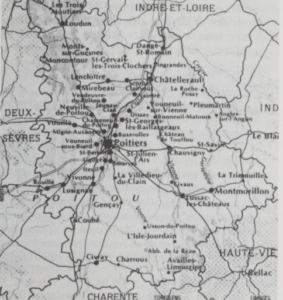
Main towns in the Vienne department; Taken from the book “Un camp de concentration: Poitiers 1939-1945”
The Agrest-Bornstajn family moved to Savigny-sous-Faye, a small, rural community about 18 miles south of Loudun and not far from Lencloître, where there were some other Jewish refugee families.
On October 9, 1942, Golda and her three children were rounded up and interned in the camp on the Limoges road in Poitiers.
As of October 1939, Spanish political refugees had been interned in this camp, then from the end of 1940 people who the Vichy regime called “Nomads” were kept there. In 1942, there were over 400 of them. The first Jewish internees arrived in the summer of 1941.
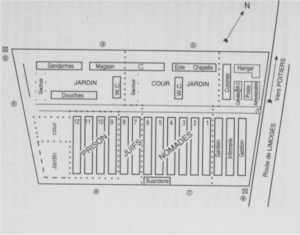
The camp on the Limoges road in Poitiers; Taken from the book “Un camp de concentration: Poitiers 1939-1945”
Conditions in the camp were extremely unhealthy, due to inadequate sanitary facilities and very limited food rations. The families were crammed into three Adrian barracks (wooden prefabricated huts) and had to sleep on the ground, on straw. There were no separate dormitories for the children, and no schoolhouse, so Volf’s education came to an end.
Golda was transferred to Drancy camp on October 15, 1942. She was among a group of 231 people, including 94 women, 86 men and 51 children. More than half of the group were Polish. Her three children remained in the camp in Poitiers because they were French citizens, which Golda was not. One can only imagine how distressing it must be for her to have to leave them behind and be sent to an unknown destination. Her children must have been equally sad, left to fend for themselves in the camp. Golda was deported to Auschwitz on convoy no. 42 on November 6 of the same year.
Rabbi Elie Bloch, with the help of Father Fleury, the Catholic chaplain for the “Nomads”, who worked in secret, managed to get some children out of the camp. He argued with officials about their status as French citizens. Jean-Marie Lemoine, the police superintendent for the Poitiers region, agreed to the release of 11 children on the grounds that they “qualified as French” citizens in November 1942.
Ainsi Volf, together with his half-sisters, Liki and Marthe were therefore released on November 12, 1942. They were placed with peasant families in and around Poitiers.
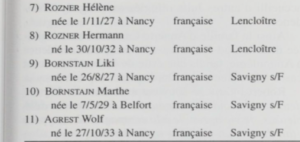
Extract from the list of children liberated on November 12, 1942; Taken from the book “Un camp de concentration: Poitiers 1939-1945”, by Paul Lévy
We note that the Volf date of birth does not match that in the civil register, which is more reliable; this must therefore be a transcription error.
They were arrested again on July 23, 1943 and again interned in the camp on the Limoges road in Poitiers. Then, guarded by police officers, they were transferred to Paris by train, in a cattle or freight car, on August 19, 1943.
When they arrived at the Austerlitz train station, in accordance with an agreement between the German authorities and Amédée Bussière, the Prefect of Paris, they were placed in the care of the UGIF (Union générale des Israélites de France, or General Union of French Jews) in a children’s home on rue Lamarck. This was used as a reception center, in which the children were quarantined for 15 days to prevent the spread of diseases and lice. Their heads were shaved and their clothes and belongings were taken away. They were given whatever clothes were available, most of which had been donated. The siblings were then separated. Liki was placed in the center for young girls on rue Vauquelin, while Wolf was sent to an orphanage in La Varenne, on the outskirts of Paris. This was a house that the Jewish community in La Varenne had taken over in 1929, and converted into a home for orphans. The “Beiss Yessoïmim” orphanage was inaugurated in 1934.
What happened to Marthe is unclear. Might she have gone with Liki? Given that Marthe was not rounded up with her sister, it would seem that she must have been taken in by someone else, especially since the home on rue Vauquelin only took in girls over the age of 15.
In July 1944, the SS officer Aloïs Brünner, who had been the commander of Drancy camp since the end of June, 1943 and was the deputy chief of the German police in Paris, decided to deport all the children who were said to be “free” but in reality were “blocked”, and not allowed to leave the children’s homes. In fact, all the children cared for by the UGIF were listed and known to the German authorities. During the night July 21-22, 1944, Brunner had all these children and their UGIF caregivers arrested, including the 28 children in La Varenne, and thus Volf.
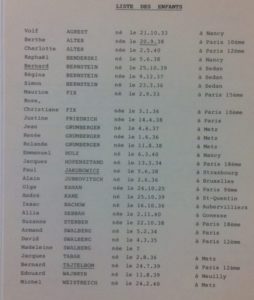
List of children from La Varenne who were arrested during the night of July 21 to 22, 1944; Ministry of Defense Historical Service, dossier ref. 21 P 482609
Out of the all the children who were arrested, 12 were from the east of France (Nancy, Metz, Sedan or Strasbourg). It should be noted that their parents had already been deported in 1942.
Volf was then transferred to Drancy, where he was reunited with Liki, who had also been arrested on that fateful night. They were deported together to Auschwitz on July 31, 1944 on Convoy 77, and both of them were murdered as soon as they arrived.
The anti-Semitic policies of the Germans and the Vichy government destroyed a large part of the family.
Martha survived, as did Henik Albert.
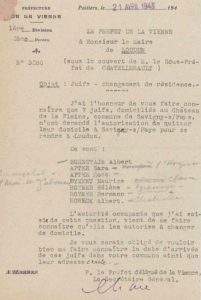
Request for the transfer of several Jews out of Loudun (1943); Vienne departmental archives
The eldest brother, Henik (Albert), lived in the outbuildings of the Château de la Plaine, as documented in this record from 1943. He worked a handyman on local farms. Along with six other Jews (three women and three men), he asked to change his residency. A later report from the prefecture shows that in the end, he stayed in Savigny-sous-Faye.
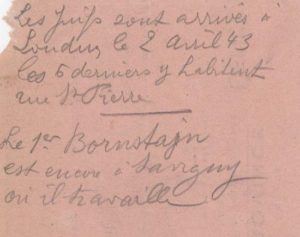
Handwritten note mentioning what happened to Henrik-Albert; Vienne departmental archives
Henik joined the Resistance in the Loudun area in August 1943. Using the pseudonym Albert Boréal, he carried out numerous assignments and deliveries, including carrying weapons, explosives, food ration cards and false identity cards; he travelled between several maquis (Resistance groups), two in the Charente department and one in Haute-Vienne. He was arrested on February 5, 1944 by the Vichy government police and interned in the Limoges prison until the city was liberated on August 21, 1944. He then took part in the German campaign. He kept the name of Albert Boréal, which he was officially allowed to use from 1987 onwards. He was awarded the status of Déporté et Interné de la Résistance, or Deported and Interned Resistance Fighter (DIR), and member of the Forces Françaises de l’Intérieur, or French Interior Forces (FFI).
During his time at the Château de la Plaine, he met Rosa Apter, who later became his wife. In 1998, she filled out the testimonial forms that can be found on the Yad-Vashem website. Albert died on December 4, 2004 in Lyon and Rosa on October 13, 2012 in Avignon. Marthe died in 1984.
In the 1980s, Nelly Wolf, a former secretary at the Beiss Yessoïmim orphanage in La Varenne, worked very hard to arrange a memorial for the deported children and staff.
In 1989, she wrote a letter to the Secretary of State for Veterans Affairs explaining that she was working “in memory” of the “little martyrs”.
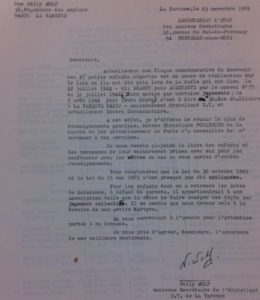
Letter from Nelly Wolf dated November 23, 1989; Ministry of Defense Historical Service, dossier ref. 21 P 482609
In 1991, she won her battle and a plaque was erected in honor of the 28 children arrested, deported and murdered in 1944. Serge Klarsfeld was present at the ceremony.
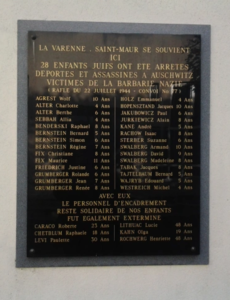
Memorial plaque installed in 1991; https://itinerairesdememoire.com/
Sources
Ministry of Defense Historical Service in Caen
- Victims of Contemporary Conflicts Archives Division, dossier ref. 21 P 482609
Ministry of Defense Historical Service in Vincennes
- Resistance department, dossier ref. GR 16 P 74640
Shoah Memorial in Paris
- Drancy files, search log and transfer log
- Serge Klarsfeld collection
Territoire de Belfort departmental archives:
- Ten-year register of births, 1 E TD 2
Nancy municipal archives:
- Nancy death register, 4 E 372
- Nancy marriage register, 1927,3 E 336
Communication via social networks with Martine Boréal, one of the two daughters of Albert Boréal, Liki’s older brother.
Bibliography
- Paul Lévy, Un camp de concentration : Poitiers 1939-1945, Paris, Sedes,1999.
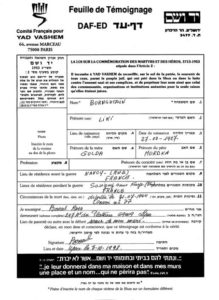
Annexe 1: Testimonial form in the name of Liki Bornsztajn, completed and submitted by Rosa Boréal
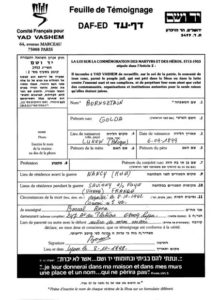
Annexe 2: Testimonial form in the name of Golda Agrest, completed and submitted by Rosa Boréal
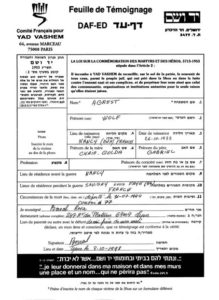
Annexe 3: Testimonial form in the name of Volf (Wolf) Agrest, completed and submitted by Rosa Boréal
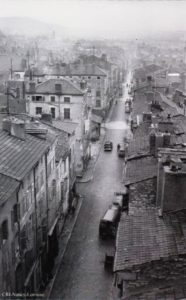
Annexe 4: photo of rue de La Hache in Nancy, sd


 Français
Français Polski
Polski